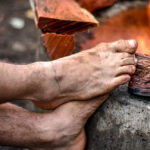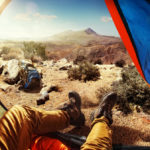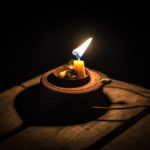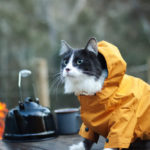Sleeping outdoors with the scent of pine trees, with snow-capped mountains as a backdrop, can be amazing, but however beautiful the surroundings are, spending a cold night in cold or freezing temperatures can take away all the pleasure. In this review, we look at various ways that the cold can be tackled.
Is it safe to have a small heater in a tent when camping?
How cold is too cold to sleep in a tent?
Maybe you do not mind extreme conditions; then, a little chill will be easy for you to manage. Still, there comes a time when it is downright uncomfortable and potentially dangerous to camp.
For people who are inexperienced and have amateur equipment:
- 30? or 40? is too cold for camping
- 50? to 70? night temperatures are ideal when camping.
Is it safe to use a heater in a tent?
No tent heater is entirely without risk, but you certainly need to choose the right heater and place it well away from the sides of the tent, or piles of clothing. Sleeping with the tent heater on, obviously increases the risk.
What type of heater can you use in a tent?
You need to choose electric heaters or flameless heater (catalytic) with CSA 4.89 certification. Although a portable heaters like gas tent heater and combustion tent heaters are available, there are safe tent heaters like the candle and electric heater that can be used instead.
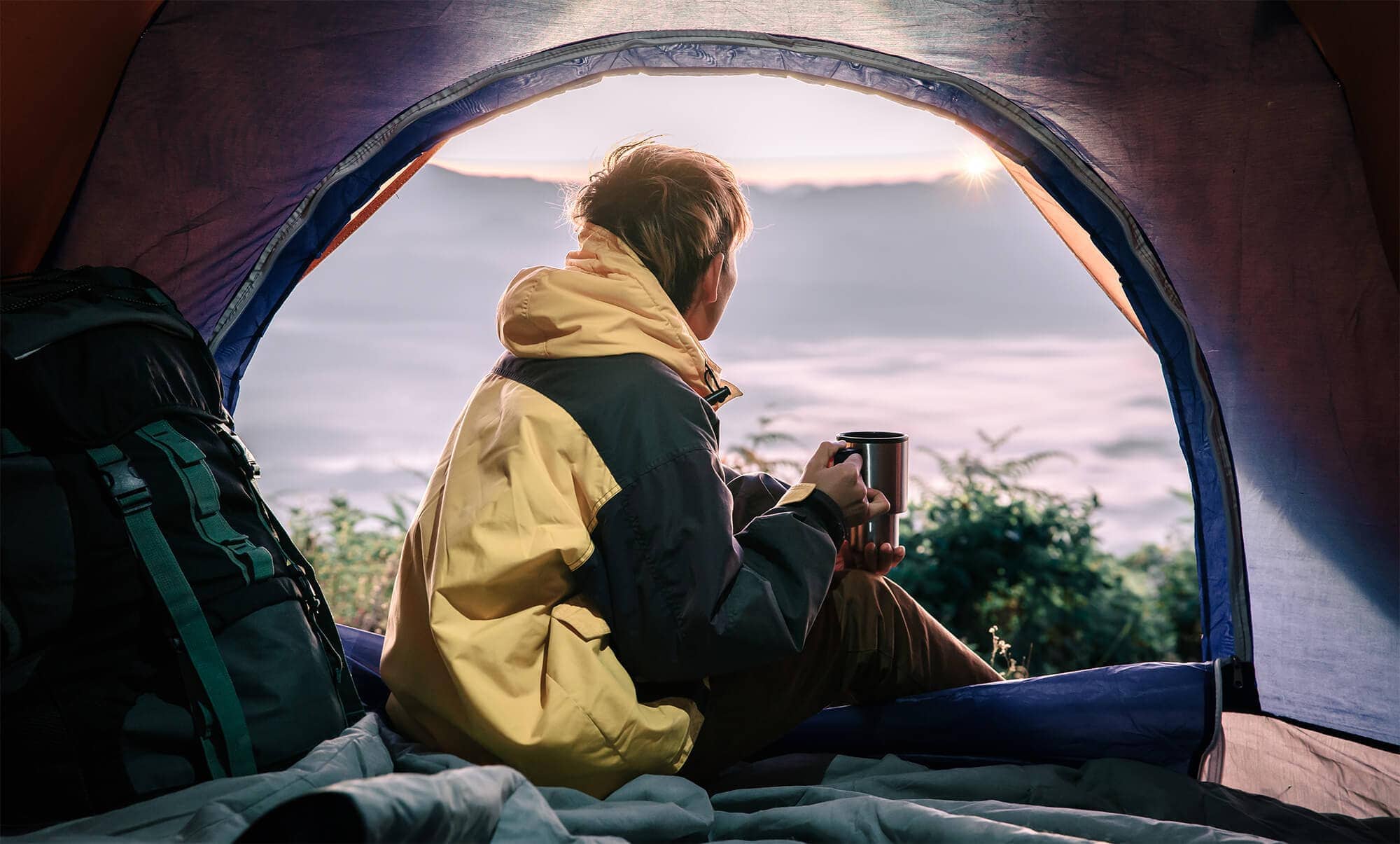
Difference between electric heaters and gas heaters
The primary danger from an electric heater is that it may tip and set the tent on fire. It may also burn too hot and melt materials. There is the danger of carbon monoxide with any heater that burns a flame (gas). There is also a risk that all the oxygen in the tent could be depleted.
Precautions
You should try and find a tent heater with an automatic propane tank cut off if the heater tips. You can get this feature on both gas and electric heaters.
You should never leave a propane heater on at night, and you should make sure that valves are shut off. You should also insist that the unit has a low oxygen sensor if it is propane powered.
Whether you need to heat an entire tent and use high powered tent heater to do so is a question to consider. In some situations, it may be better to heat the sleeping sack or wear a personal electric heating system.
Candle heaters are the safest form of tent heating. This old technology, the Candle lamp/heater, is often overlooked. People are surprised that a lamp containing three candles can throw out sufficient heat to warm a tent, or boil water.
Reviews
I am now going to review some alternative types of tent heater that are currently available. I have included heating systems powered by Gas, Power Banks, and Candles. Electricity proved too impractical.
UCO Candlelier Deluxe Candle Lantern
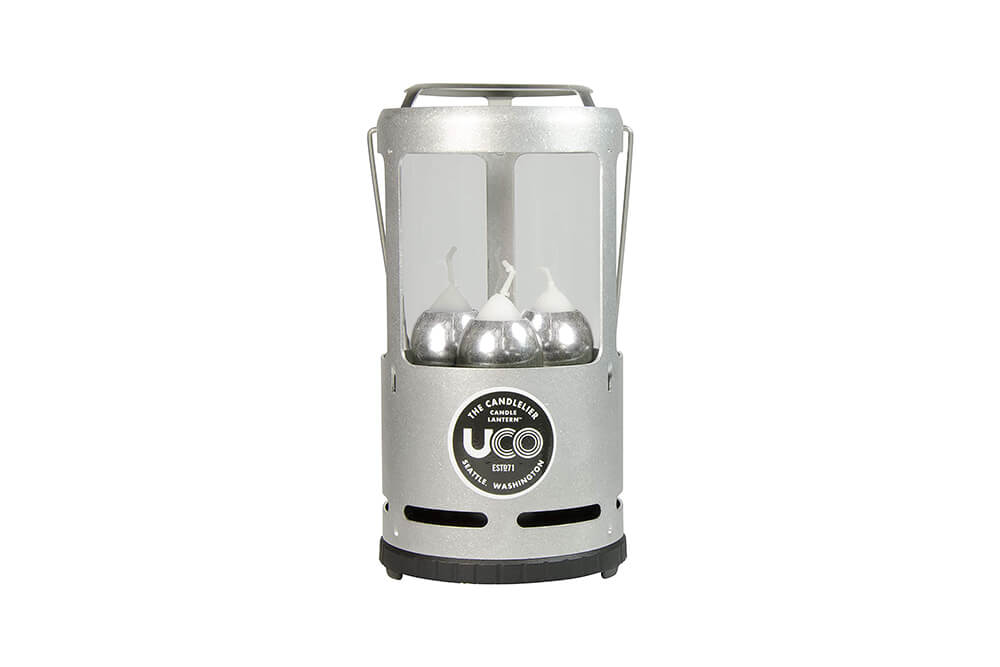
The best camping tent heater has to be the UCO Candlelier Deluxe Candle Lantern It meets all the main safety concerns. It has added features that other heaters do not have.
The unit comes with three candle slots, and you can use citronella candles to keep mosquitoes away. It is well tried and tested over many years, providing both heat output and light.
Pros
Flame entirely contained in glass, and if it tips over, there is no problem. The ability to use a citronella candle is also a useful feature when mozzies are a problem. It is a simple technology, not a lot to fail.
The unit provides a pleasant light as well. It can be used to heat water, and small amounts of food (it takes 30 minutes or more).
Cons
You have to buy the candles online (they last about 9 hours). It will not keep you warm enough if the temperatures plunge below 40 Degrees.
Verdict on product and safety
Because it is fundamental technology, there is no auto shut off if it tips over. However, it remains pretty safe. I would say overall; it is the most reliable heater, which is why it scored so high.
The product itself is well made, and there is some control over the heat output and light it emits, as there are three candles in the unit, and you can light one, two, or three candles.
Agemore Heated Sleeping Bag Liner
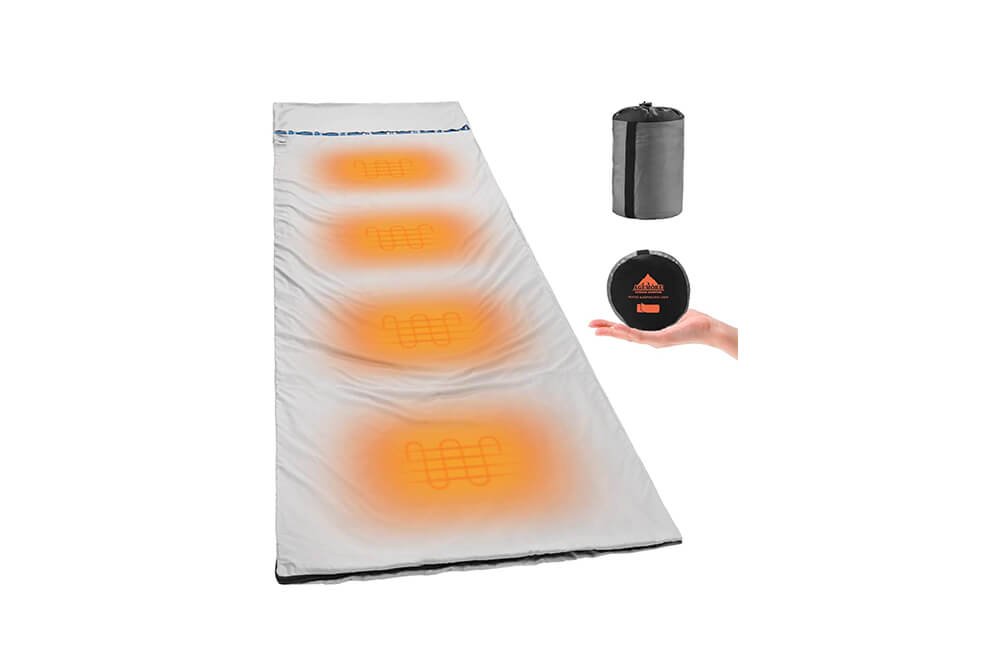
Heating the whole tent requires either a gas-powered portable space heater or central electric heater.
When you are sleeping at night, your primary concern is keeping warm inside the sleeping bag, so why not concentrate on heating the bag and hood?
Pros
Utterly safe as is powered from a 10000mAh 5V1A power bank. Four heated areas are covering the whole length of the sleeping rucksack.
Cons
It only warms the sleeping rucksack; the rest of the tent is left unheated. You have to have a way of recharging the power bank (your vehicle will be one way).
It will only heat for four hours at the highest heat output setting, six at a medium setting, and twelve hours at the minimum setting.
Verdict on product and safety
If all you are worried about is staying warm while you sleep, concentrating your efforts on heating sleeping bags makes more sense.
The liner rolls up into a minimal space and is not heavy to carry. It is entirely safe to use,
Dr. Prepare Unisex USB Heated Vest
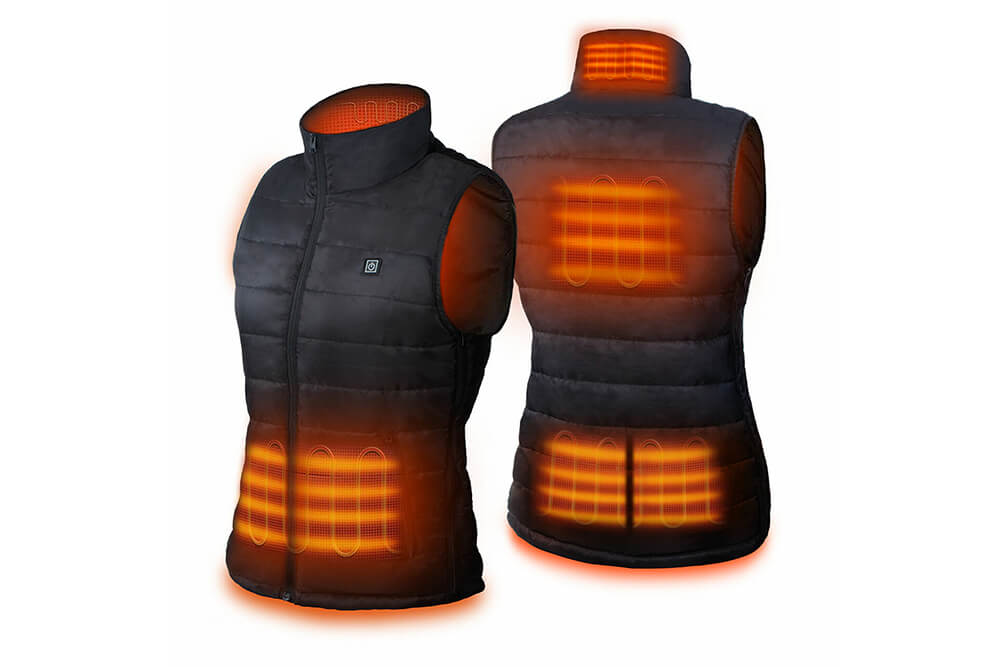
If only being warm in the sleeping rucksack is an issue, why not wear your electric heater? This heated vest can be worn in the sleeping rucksack at night and when you are out and about.
Safer than a gas heater or an electric tent heater that might set the tent on fire, these personal vests are safe and powered by a power bank.
Pros
These vests are safe with overheating auto cutoff. The heat source is close to your skin, so less heat output still feels warmer.
Charge several power banks before you go away and switch power banks every night. The power bank sits inside a particular pocket.
Con’s
They only warm the top half of your body. They either require multiple power banks or a means of charging daily.
Verdict on product and safety
This product is a practical solution to keeping warm. Used for many years in refrigerated warehouses, they are a proven technology.
Mr. Heater F215100 MH4B Little Buddy 3800-BTU
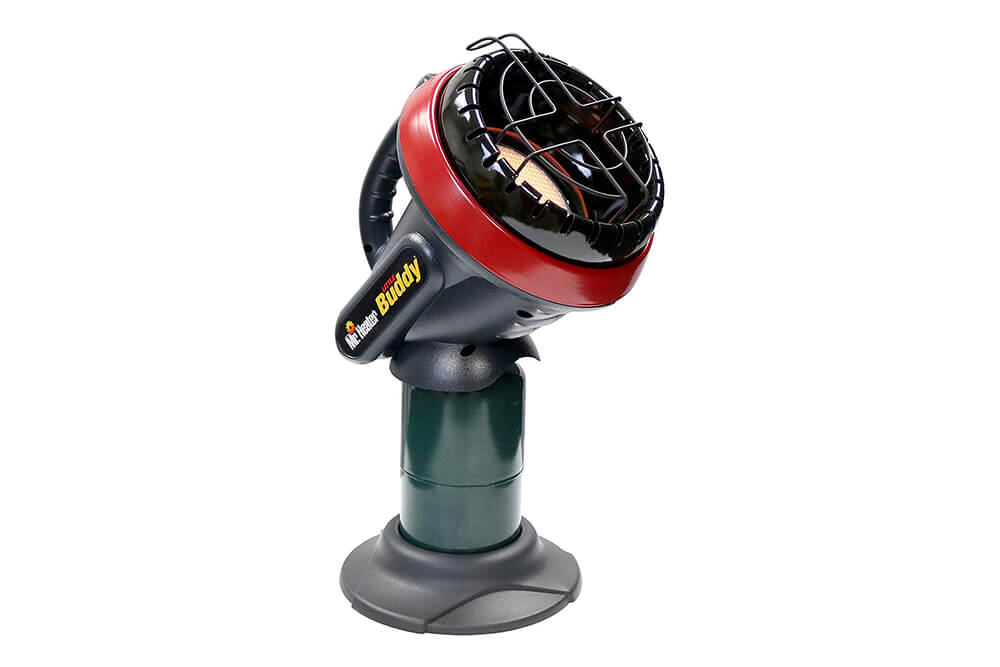
If you want a more traditional tent heater, then the little buddy is my suggested model. Do not confuse this with similar-looking tent heaters, which are NOT safe to use inside your tent. This heater was specially designed for indoor use.
Pros
This product will generate far more heat than the previous products in this review. If you are expecting frigid weather, this is a better solution. The heater also has an auto shut off safety features if the heater is knocked over.
Cons
It is bulky to carry. It is designed for a 1lb propane bottle, which would only run the heater for up to five hours on the low setting. It will not work correctly at high altitudes (over 4,500 ft).
Although they are a reliable tent heater you will need to be mindful of gas leaks and carbon monoxide poisoning. Not that it will happen but making sure you have the proper leakage indicators in place should provide a sense of security when using any butane heater.
Verdict on product and safety
This heater uses propane. When Burning propane, carbon dioxide is released if there is sufficient oxygen in the environment. If there is not, it would then produce the dangerous Carbon monoxide.
However, this heater has a sensor that recognizes when there is not enough oxygen in the air and shuts off the heater.
I would prefer to have a backup and buy a cheap carbon monoxide alarm, which would wake me before there was any danger.
Mr. Heater MH18B Propane Heater, Red
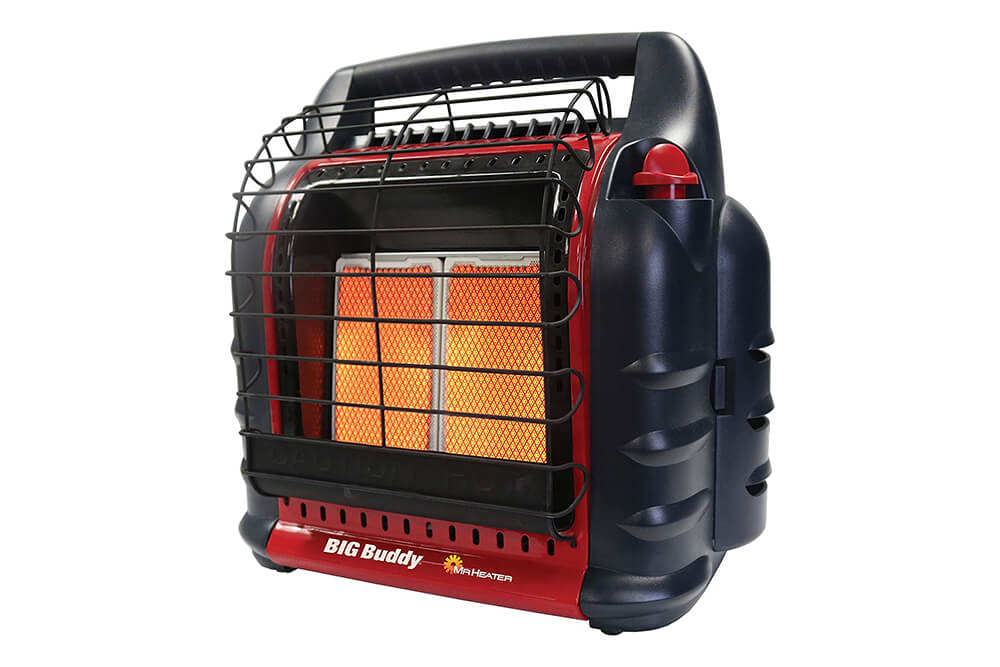
This model is another product in the Mr. Heater range. It is approved for indoor use in tents. It will work up to an elevation of 7,000 ft. It has a run time of 5.6 hours and uses a one-pound propane bottle.
Pros
This model is a more compact unit than the previous model. It features cut off when the unit tips over, or the oxygen level drops.
This last feature is why the model fails at high altitudes as the low oxygen sensor gets confused by the lower oxygen at altitude. It is simple to operate with just a single on/off switch.
Cons
It can prove challenging to fire up; the gas sometimes will not light using the pilot light. Some people have also found that the model leaves the smell of propane.
Verdict on product and safety
This little heater has all the suggested safety features built-in and seems to do the job well. There is some doubt whether it would heat a large tent in icy weather, but for the small hiking tents, then it is okay.
Wrapping up
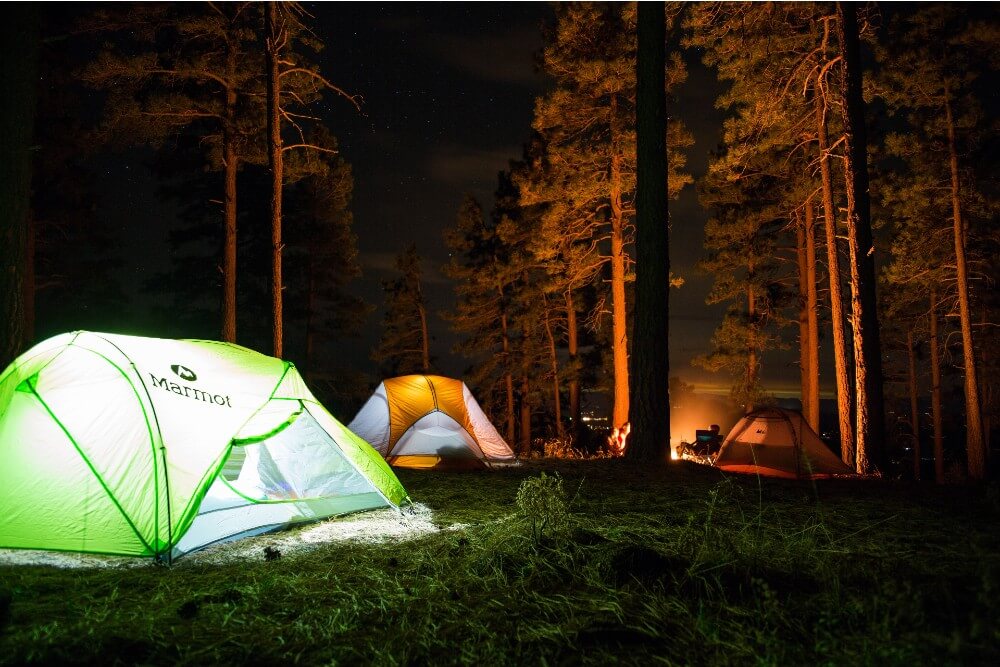
I have not included any electric tent heaters in this review. They need a mains power connection, which is fine in some better campsites, but not always available.
Had they performed substantially better than the last two gas tent heaters, then I would have included them. Still, the difference was so marginal that the mains power issue outweighed any advantage.

